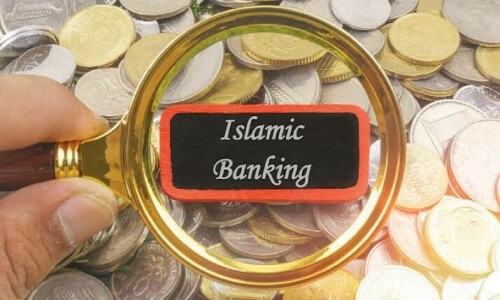KARACHI: The private sector’s contribution to the economy, if bank borrowing is taken as an indicator, has come down drastically over the last 18 months.
Data recently issued by the State Bank of Pakistan (SBP) reveal that the sector was unable to stage a meaningful recovery during the first four months (July-October) of FY24.
The data show a repeat of FY23 when the private sector’s borrowing from banks plunged to Rs208 billion from Rs1,329.7bn in FY22.
This massive drop in bank advances to the private sector changed the big picture as the economy contracted by 0.17 per cent in FY23 against a robust growth of 6.17pc in the preceding year.
Conventional, Islamic banks witness net debt retirement
The caretaker government looks desperate to bring foreign investment but seems to have ignored the private sector. An unprecedented interest rate of 22pc with 29pc inflation does not allow trade and industry to take risks. This low participation of the private sector badly affected the growth rate, causing massive unemployment.
At the same time, banks are reluctant to extend loans to the private sector as a high interest rate increases the chances of default adding to their non-performing loans (NPLs) and disrupting their balance sheets.
The SBP data show that conventional banks recorded net debt retirement of Rs45.8bn by the private sector from July 1 to Nov 17 this year, compared to a net borrowing of Rs161.7bn during the same period of the previous year.
The figures for Islamic banks were no different. The net debt retirement, as recorded by Islamic banks, was Rs35bn during the same period, compared to a net borrowing of Rs20.6bn the previous year.
However, the Islamic branches of conventional banks were able to improve their stock over the previous year. The Islamic branches noted a debt retirement of Rs1.7bn only, compared to Rs149.8bn during the same period of last year.
In the entire fiscal year FY23, the net retirement recorded by Islamic branches stood at Rs425.7bn.
The private sector’s poor participation in the economy could further slash the growth rate. The IMF, the World Bank and the government believe a growth rate in the range of 2-3pc is achievable in FY24.
Independent economists and analysts foresee a significant cutback in the Public Sector Development Programme (PSDP) amid warnings of a larger-than-expected fiscal deficit for FY24.
The IMF has already criticised the PSDP in its Technical Assistance Report for the country. The report said the PSDP is unaffordable and should be reassessed. On the other hand, some analysts believe that a higher PSDP is unavoidable for stimulating the economy.
Published in Dawn, December 5th, 2023














































Dear visitor, the comments section is undergoing an overhaul and will return soon.